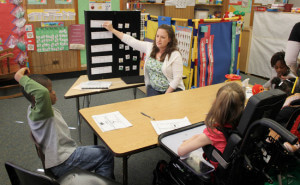 Due to nationwide teaching shortages in regular and special education classrooms, alternative teacher certification programs have become more commonplace. The demand is especially high in rural and urban school settings. As a result, non-traditional pathways have been established so potential teachers can become endorsed in special education according to state and federal regulations. Candidates might be first-time teaching applicants who come from other degree backgrounds or be teaching professionals who are interested in switching their career focus.
Due to nationwide teaching shortages in regular and special education classrooms, alternative teacher certification programs have become more commonplace. The demand is especially high in rural and urban school settings. As a result, non-traditional pathways have been established so potential teachers can become endorsed in special education according to state and federal regulations. Candidates might be first-time teaching applicants who come from other degree backgrounds or be teaching professionals who are interested in switching their career focus.
Qualifications for Seeking Alternative Special Education Certification
Candidates must first seek provisional certification to teach in special education programs. Provisional certification lasts between one to five years, depending on the state, and candidates must continue further training in the field while teaching during this period. One or more of the following criteria may be required to enter alternative teacher certification programs:
- Holding a bachelor’s degree from an accredited school in any field
- Previous teaching experience
- Passing the PRAXIS teaching exam, the graduate admissions test or a state assessment
- Having recommendations from school district members or college advisers
- Passing a national background check
- Agreeing to complete additional coursework and training in special education.
Alternative Special Education Certification Programs
Traditional special education degree programs have long been the preferred educational pathway. However, perceptions about non-traditional certification programs have improved as instructional standards gain credibility. Candidates without teaching backgrounds often end up earning a Master in Special Education that leads to endorsement and licensing. By contrast, candidates who already hold teacher certification in some educational area need only take master’s level classes to qualify them for an additional teaching endorsement. Special education coursework for either track usually covers the following areas:
- Individualized education foundations
- Diagnostic educational assessments and individualized education plans
- Special education curriculum and instructional planning
- Literacy, math and general content instruction for students with disabilities
- Diverse learning populations with special education needs
- Behavioral, emotional and medical aspects of disability populations
- Alternative teaching methods and technology devices for learners with severe disabilities
- Inclusion, mainstreamed, resource and self-contained classroom models
- Legal and ethical protocols in special education
Benefits of Earning Alternative Teaching Certification
Working with students who have exceptional learning needs is a rewarding experience. Special educators can work one-on-one or in small groups with their students and get to know them on a deep level that isn’t always possible in larger class groups. Their work is dynamic whether teaching resource or remediation classes, collaboratively instructing in regular education classrooms or teaching life skills classes for students with severe disabilities.
Special educators can also look forward to competitive job opportunities due to the demand for their expertise in many locations around the country. Employers appreciate teachers who bring real-world experiences and broad knowledge to the classroom, so whether considering a first-time teaching career or choosing a different teaching focus, earning an alternative teacher certification can lead to meaningful careers.




